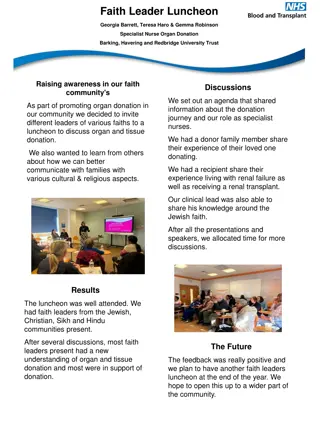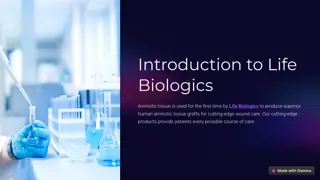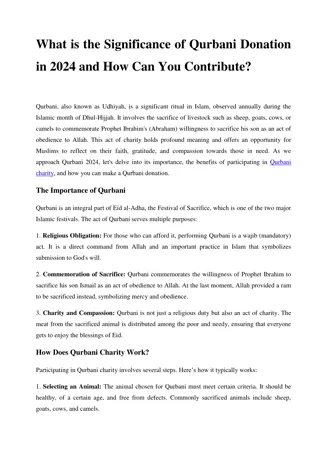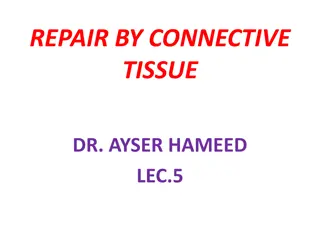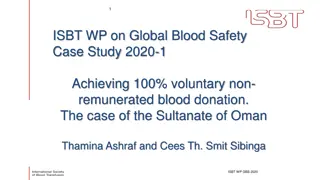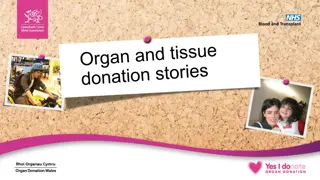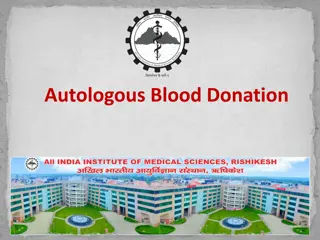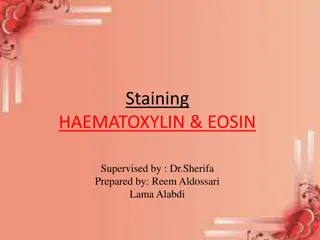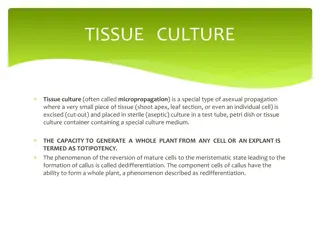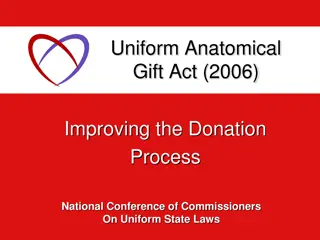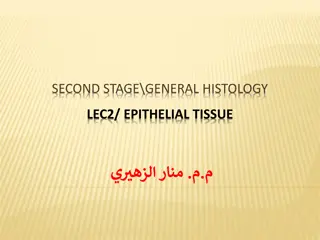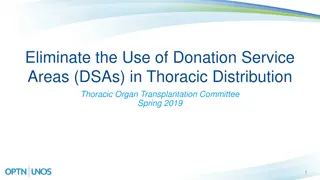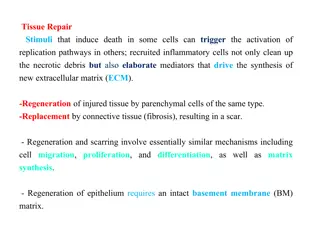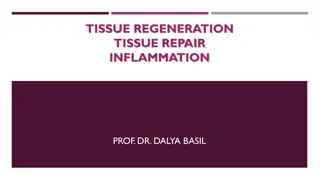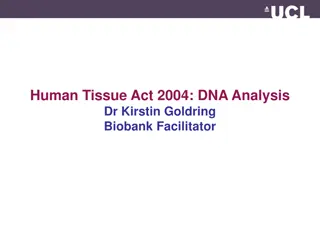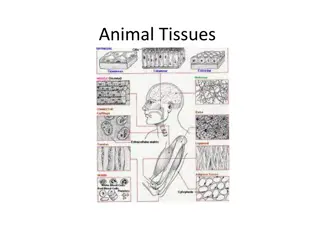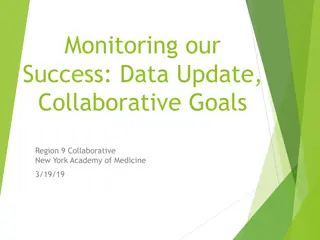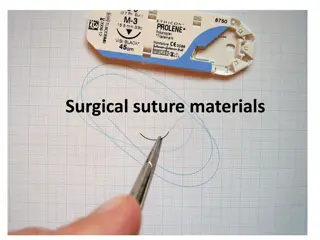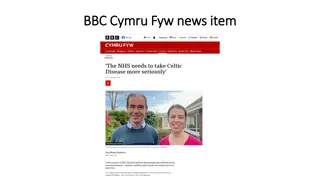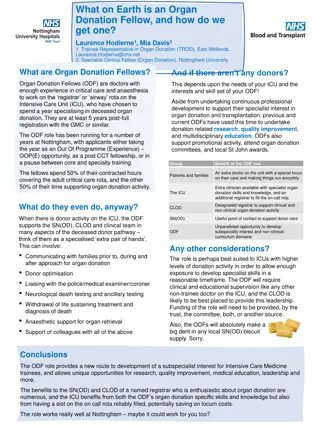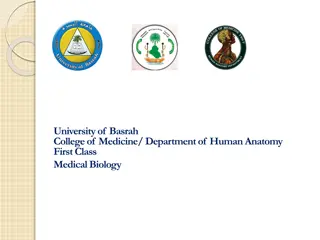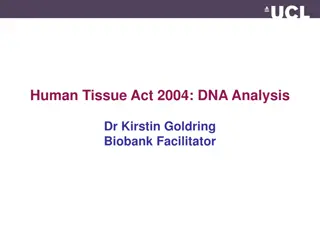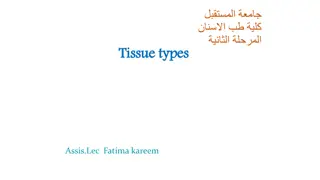Understanding Organ Donation in Hong Kong
Explore the various aspects of organ donation in Hong Kong, including suitable organs for donation, living and cadaveric donation processes, low donation rates, common misconceptions, and how to register as an organ donor through the Centralised Organ Donation Register. Discover the opt-in and opt-o
3 views • 28 slides
Engaging Our Community: Organ Donation Initiatives and Success Stories
Two impactful initiatives in the healthcare sector aimed at promoting organ and tissue donation within communities are highlighted. The first initiative involves hosting luncheons with faith leaders to educate and raise awareness, resulting in increased support for donation. The second initiative sh
0 views • 4 slides
Advancing Healthcare: Potential of Advanced Amniotic Tissue by Life Biologics
Life Biologics is at the forefront of using amniotic tissue to develop premium human amniotic tissue grafts for advanced wound care. Our innovative products offer patients a comprehensive range of treatment options. Life Biologics' advanced skin substitutes provide a revolutionary solution for both
0 views • 5 slides
What is the Significance of Qurbani Donation in 2024 and How Can You Contribute
This act of charity holds profound meaning and offers an opportunity for Muslims to reflect on their faith, gratitude, and compassion towards those in need. As we approach Qurbani 2024, let's delve into its importance, the benefits of participating in Qurbani charity, and how you can make a Qurbani
2 views • 3 slides
Exploring Symbolism and Connections in "Tissue" by Imtiaz Dharker
This analysis delves into the symbolism present in Imtiaz Dharker's poem "Tissue," drawing connections between paper, human skin, and architecture. The poem reflects on the fragility of human power through the metaphor of tissue and explores the intricate layers that make up an individual's identity
0 views • 23 slides
Understanding Plant Tissue Culture: Methods and Requirements
Plant tissue culture involves the in-vitro culture of plant explants under aseptic conditions, covering cell, organ, and suspension cultures. This process, pioneered by German botanist Gottlieb Haberlandt, relies on the totipotency of plant cells. Key requirements include laboratory organization, su
0 views • 18 slides
MTF Biologics: Advancing Healthcare Through Tissue Donation
MTF Biologics is a global nonprofit organization dedicated to saving and healing lives through tissue and organ transplantation. They uphold high standards, provide exceptional services, and support healthcare providers, donors, patients, clinicians, and researchers. By transforming, collaborating,
0 views • 19 slides
Understanding Repair by Connective Tissue in Healing Processes
Healing or repair by connective tissue occurs in response to severe or chronic tissue injuries, leading to the replacement of nonregenerated cells with connective tissue or scar formation. This process involves the induction of fibroblast and endothelial cell proliferation, granulation tissue format
3 views • 26 slides
Achieving 100% Voluntary Non-Remunerated Blood Donation in Oman
In the Sultanate of Oman, the Department of Blood Services has successfully moved towards 100% Voluntary Non-Remunerated Blood Donation (VNRBD), focusing on motivating the public to donate blood regularly. This shift has led to a significant increase in blood donations from 2007 to 2011, with a grow
1 views • 26 slides
Organ Donation Awareness and Education Activities
Explore the importance of organ donation through engaging activities, such as quizzes on organ and tissue donation facts and myths. Learn about the various organs and tissues that can be donated, the significance of registering on the NHS Organ Donor Register, and the impact of organ donation in sav
1 views • 26 slides
Autologous Blood Donation: Advantages, Types, and Considerations
Autologous blood donation involves collecting and storing a patient's own blood for later transfusion, offering numerous advantages such as reducing the risk of transfusion-transmitted diseases and providing compatible blood for patients with allo-antibodies. However, it also comes with concerns lik
1 views • 46 slides
Understanding H&E Staining in Histology
H&E staining, a widely used histological technique, involves staining cell nuclei blue and cytoplasmic components pink to aid in tissue structure analysis. This method provides essential insights into normal and pathological tissue changes, assisting in diagnoses and further testing decisions. The p
0 views • 7 slides
Understanding Plant Tissue Culture: Techniques and Applications
Plant tissue culture involves maintaining and growing plant cells, tissues, or organs in artificial mediums under controlled conditions. It allows the regeneration of whole plants from small plant parts or cells. Hormones like auxins, cytokinins, and gibberellins are used in the process. Proper envi
3 views • 5 slides
Donation Page Optimization Guide
Learn how to enhance your donation page settings for improved user experience and increased fundraising success. Discover essential customization tips, admin permissions setup, and dedication options to maximize your donation campaign impact.
0 views • 17 slides
Understanding Tissue Culture and Explant Selection in Plant Micropropagation
Tissue culture, or micropropagation, involves propagating plants from small tissue pieces in sterile culture. The process of dedifferentiation and redifferentiation allows for the regeneration of whole plants from individual cells or explants. Explants, selected from meristematic tissue, develop cal
0 views • 47 slides
Efficient Management of Donations at Donation Bank
Donation Bank is a non-profit organization that collects gifts from private individuals. Gifts need to be certified for tax deduction purposes and attributed to specific projects. Donors receive acknowledgements and certificates for their contributions. The organization maintains archives for person
0 views • 19 slides
Modernizing Organ Donation Laws: The Uniform Anatomical Gift Act of 2006
The Uniform Anatomical Gift Act (UAGA) of 2006 aims to enhance the donation process by introducing new definitions, emphasizing personal autonomy, and providing clearer rules. It addresses the need for uniformity, updates to reflect current practices, and modernizes the Act to ensure a smoother orga
0 views • 14 slides
Understanding Epithelial Tissue in General Histology
Epithelial tissue is a crucial type of tissue in the human body, performing functions like protection, absorption, secretion, and sensation detection. This tissue is composed of cells with minimal extracellular matrix and plays a vital role in various bodily processes. Learn about the classification
0 views • 47 slides
Ethical Considerations in Organ Donation for Neurologically-Aware Patients
This information highlights the process of honoring the desire of neurologically-aware patients to donate organs after circulatory death. It discusses the referral, legal authorization, triggers for consideration, and ethical aspects involved in approaching and discussing organ donation with the pat
0 views • 15 slides
Bringing Life Through Organ Donation: Two-Week Action Plan
Over the next two weeks, the Gift of Life aims to refocus on connecting with palliative care teams, educate ICU staff on the importance of early referrals, raise awareness in the Caribbean community about organ donation, coordinate information sessions with OPO liaisons, and encourage colleagues to
0 views • 64 slides
Proposal to Remove Donation Service Areas in Thoracic Organ Transplantation
The proposal aims to ensure compliance with regulations by eliminating Donation Service Areas (DSAs) in thoracic organ allocation policies. The suggested solutions involve replacing DSAs with a 250 NM distance from the donor hospital, removing language allowing prioritization of sensitize heart cand
0 views • 10 slides
Understanding Tissue Repair Mechanisms: Regeneration and Fibrosis
Tissue repair involves complex mechanisms like regeneration by parenchymal cells or fibrosis leading to scar formation. Inflammatory cells play a crucial role in tissue repair, along with processes like ECM synthesis and cell migration. Different types of cells in the body have varying regenerative
0 views • 20 slides
Tissue Regeneration, Repair, and Inflammation Explained
Tissue regeneration and repair processes involve either regeneration of cells or connective tissue repair, depending on the type of cells injured. In cases where regeneration is not possible, healing occurs through the formation of scar tissue. The healing process aims to restore the structural cont
0 views • 40 slides
Understanding Tissue Repair: Regeneration and Fibrosis Mechanisms
Tissue repair involves two primary mechanisms: regeneration, where some tissues can replace damaged cells, and fibrosis, where scar tissue forms if regeneration is not possible. Cell proliferation, growth factors, and cell population control play key roles in the restoration of tissue architecture a
0 views • 15 slides
Understanding the Human Tissue Act 2004 and DNA Analysis
The Human Tissue Act 2004 regulates the removal, storage, and use of tissue and organs from both living and deceased individuals in England, Wales, and Northern Ireland. The Human Tissue Authority (HTA) oversees the implementation of this act, ensuring safe and ethical use of human tissue. Consent i
0 views • 20 slides
Proposed Ordinance for Donation Box Regulations in Houston
Vice Mayor Pro Tem Castex-Tatum received complaints about unauthorized donation boxes in District K, leading to a survey identifying issues like clutter and safety hazards. As a result, regulations are being developed for all donation boxes in the city, including requirements for operator contact in
0 views • 12 slides
Understanding Animal Tissues: Epithelial, Muscle, Nerve, and Connective Tissues
Explore the four general categories of animal tissue - epithelial, muscle, nerve, and connective tissues. Learn about the traits, classification, examples, and functions of each type of tissue. From the tightly packed cells of epithelial tissue to the excitable nature of muscle tissue, delve into th
1 views • 22 slides
Organ Donation and Transplantation Myths True or False
Explore common myths and facts about organ donation and transplantation through a fun true or false game. Learn the truth behind misconceptions like who can be a donor, the possibility of brain transplants, where to register as a donor, fairness in organ allocation, and the impact on funeral arrange
1 views • 14 slides
Organ Donation Collaborative Data Update and Goals Review
The data update and collaborative goals review for the Region 9 Collaborative at the New York Academy of Medicine includes information on national data for total donors and transplanted organs from 2014 to 2018. The goals of the collaborative focus on enhancing organ donation rates and achieving spe
0 views • 9 slides
Understanding Surgical Suture Materials and Techniques
Surgical sutures play a crucial role in wound repair by providing support and hemostasis to healing tissue. An ideal suture should meet specific criteria for handling, reaction in tissue, bacterial growth inhibition, knot security, and more. Factors like suture size, flexibility, and surface charact
0 views • 24 slides
Managing Genetic Haemochromatosis Through Blood Donation: Opportunities and Challenges in Aberystwyth
Genetic Haemochromatosis (GH) patient shares journey from diagnosis to becoming a blood donor for treatment. Limited donation sessions in Aberystwyth pose challenges for induction and maintenance phases. Request for additional sessions in summer to support GH patients.
0 views • 5 slides
Organ, Eye, and Tissue Donation: Facts and Education for the Classroom
Explore essential information on organ, eye, and tissue donation, including common questions, the impact of donation, and how to register as a donor. Learn about the waiting list for transplants, the significance of eye donation, and the process of becoming a donor to save lives. This fact sheet pre
0 views • 11 slides
Baobab Winter Donation Drive - Spreading Warmth to Needy Communities
Baobab Networking Center, an NPO established in 2017, focuses on technology awareness, poverty alleviation, and supporting disadvantaged communities. Their upcoming project aims to provide basic resources to underprivileged areas in South Africa, collecting donations in the form of clothing, blanket
0 views • 11 slides
Understanding the Role of Organ Donation Fellows in Intensive Care Units
Organ Donation Fellows (ODFs) are experienced doctors specializing in deceased organ donation, spending time on the ICU rota and supporting organ donation activities. They assist in donor optimization, communication with families, and organ retrieval, benefiting both ICU patients and the healthcare
0 views • 4 slides
Promoting Live Donation and Enhancing Transplant Listing Data
This update covers efforts to raise awareness for live donation through social media, email campaigns, and public events. Additionally, progress is reported on maintaining transplant listing data with a focus on improving preemptive listing rates for CKD5 patients. The dashboard data shows consisten
0 views • 11 slides
Performance-Based Budget Board Tax Credit Reviews & Innovation Zones Presentation
The presentation on Tax Credit Reviews highlights objectives, performance metrics, and specific recommendations for improvement. It focuses on job creation in high-tech sectors, infrastructure upgrades, and encouraging innovation through programs like Keystone Innovation Zones and Organ/Bone Marrow
0 views • 30 slides
Understanding Epithelial Tissue in Human Anatomy: A Comprehensive Overview
Epithelial tissue is a vital component of the human body, serving as a protective barrier and interface with the external environment. This tissue type, along with other essential tissues, plays a crucial role in the development and function of organs. Learn about the structure, function, and signif
0 views • 22 slides
Understanding Basic Histology and Tissue Types
Explore histology, tissues, and types of tissues including epithelial, connective, muscle, and nerve tissues. Learn about tissue characteristics, differences, and functions, as well as details on specific tissue types like cardiac muscle, bone tissue, skeletal muscle, and smooth muscle. Delve into e
0 views • 74 slides
Regulation of Human Tissue and DNA Analysis under HTA 2004
The Human Tissue Act 2004 regulates the removal, storage, and use of tissues from deceased and living individuals. The Human Tissue Authority oversees the implementation of this act and provides guidance on safe and ethical use of human tissue. The act covers bodily and relevant material and emphasi
0 views • 20 slides
Understanding the Four Basic Types of Tissue
Explore the four basic types of tissue in the human body: connective tissue, epithelial tissue, muscle tissue, and nervous tissue. Learn about their functions and characteristics to gain a deeper understanding of the body's structure and functions after a lecture session.
0 views • 7 slides

